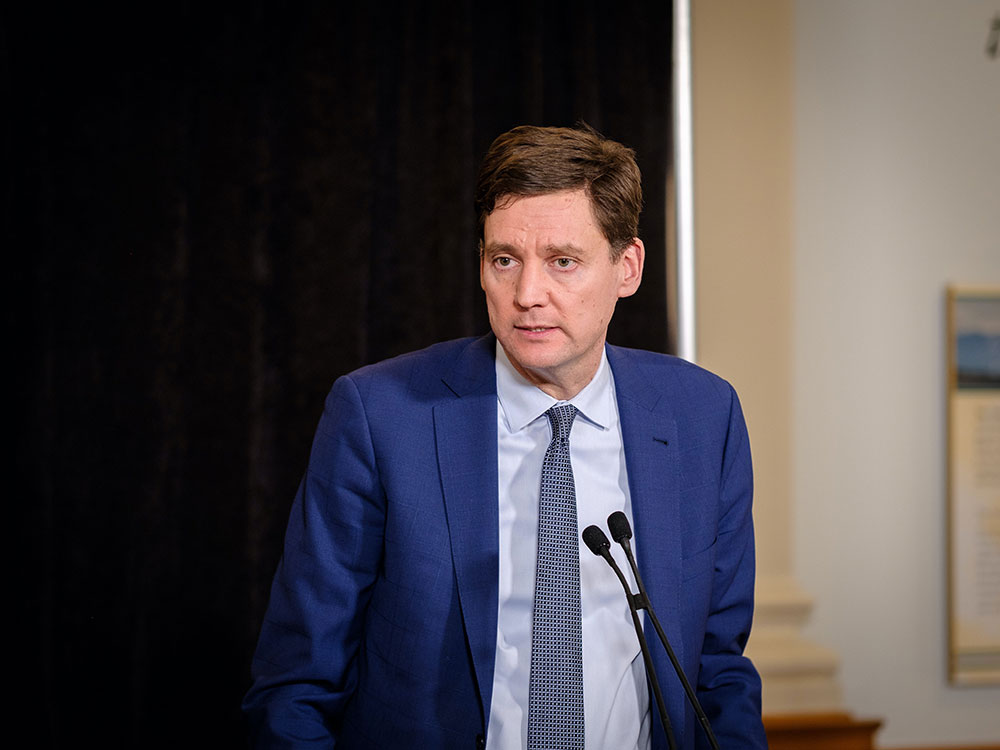B.C. is enthusiastically welcoming the federal government’s first steps toward a national pharmacare plan, but BC United Leader Kevin Falcon says other provinces are right to be skeptical.
“I have to admit, I’m a bit perplexed by the reaction to some provinces about this announcement,” Premier David Eby said. “It feels like good news to me.”
Thursday morning the federal Liberal government introduced Bill C-64, "An Act Respecting Pharmacare." The result of a deal with the federal NDP for support, the bill commits the government to provide single-payer coverage for certain diabetes medications and birth control as a first step.
Since health care is the responsibility of provinces and territories, implementing the new program will depend on their agreement. The plan is to eventually expand it to more drugs.
Eby said that while some details need to be worked out, including how the new program will affect B.C.’s existing coverage of contraceptives, it’s great that the federal government is going to pay for some drugs that people need for their health.
“I’m certainly not hostile to it,” he said. “Any time the federal government wants to launch a new program where they’re paying for stuff for BCers, hey, come on over to B.C. We’re glad to see you.”
According to the federal government, the plan will cover the cost of contraceptives for nine million Canadians and diabetes medication for 3.5 million.
Before the plan was introduced, politicians in Ontario said they needed more details before deciding whether to opt in, and Alberta Health Minister Adriana LaGrange was quoted saying her province would opt out.
BC United Leader Kevin Falcon said provinces are right to be skeptical.
“I’m always concerned when the federal government tries to muscle into provincial areas of jurisdiction,” he said. “Often what happens with the federal government is they will come in with dollars and then somehow, years later, they’re no longer providing the dollars and the bills are left with the provincial governments.”
Provinces need to ask a lot of tough questions about how the program is going to work, who it will benefit and whether the funding is sufficient, said Falcon, whose cabinet posts in BC Liberal governments included finance and health. “I just think caution would be the watchword based on my history of dealing with federal governments.”
Federal Health Minister Mark Holland has said that the first phase of the program will be used to evaluate its effectiveness.
The diabetes coverage will include access to medications including insulin, as well as supplies people with diabetes need to manage, monitor and administer their medication, such as syringes and glucose test strips. The birth control coverage will include oral contraceptives, copper and hormonal IUDs, injections, implants, rings and morning-after pills.
The announcement did not include a cost estimate, but in October the parliamentary budget officer said a wider single-payer universal drug plan would cost governments an added $13.4 billion in five years.
The federal government is talking about “first dollar coverage,” where the covered medications are free to the people who need them, B.C. Health Minister Adrian Dix said.
B.C. has worked in recent years to improve the province’s PharmaCare program for vulnerable and low-income people, particularly seniors, but gaps remain, Dix said. “The gap we’re talking about is we have an insurance system and it’s income-based.”
PharmaCare, like most private drug plans, has deductibles where, depending on their income, people have to pay a certain amount themselves each year before the plan will begin paying.
Dix said he spoke Wednesday with federal Health Minister Holland and discussed how the new program would interact with B.C.’s existing coverage.
“He said that B.C. would absolutely not lose out because we’ve already established a free contraception system here,” Dix said. “In fact, it really should be a source of pride for people in B.C. that the reforms we made here are going to be made national.”
The federal government is taking a practical approach by starting with just the two drug categories, Dix said, adding that even that will have a significant cost. “Clearly they’re calibrating their entry into this field of endeavour.” ![]()
Read more: Health, Federal Politics, BC Politics

















Tyee Commenting Guidelines
Comments that violate guidelines risk being deleted, and violations may result in a temporary or permanent user ban. Maintain the spirit of good conversation to stay in the discussion and be patient with moderators. Comments are reviewed regularly but not in real time.
Do:
Do not: